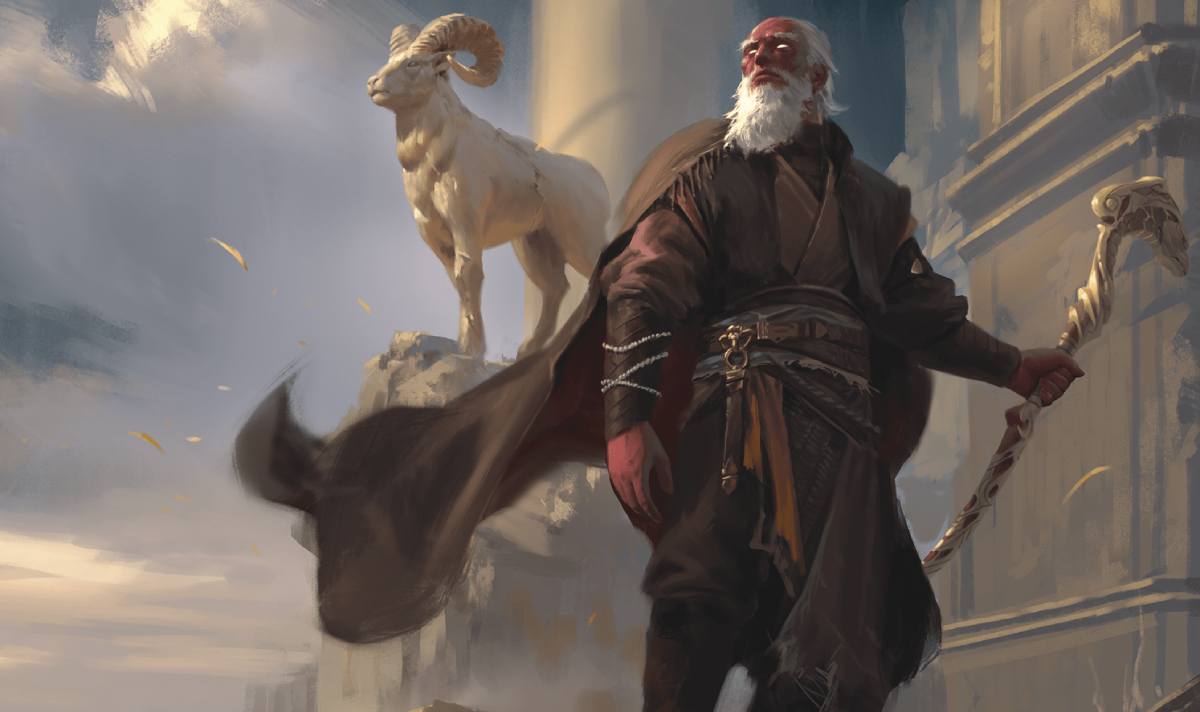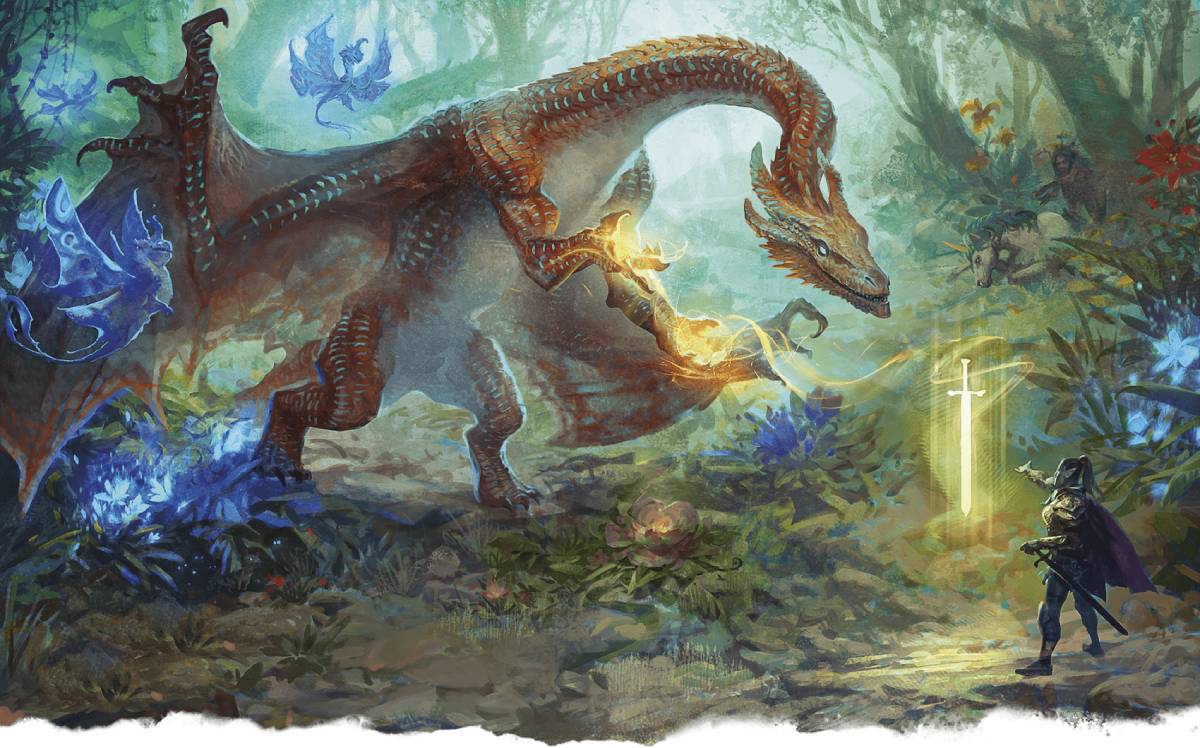The tavern is quiet tonight—no clatter of mugs, no roaring laughter. Just one chair pulled back. One pair of boots on the road. One hero.
While most Dungeons & Dragons adventures are built for parties of four to six characters, Dragon Delves includes three adventures that are well-suited for play with a single adventurer. These one-on-one experiences cast a single character in the starring role of their own cinematic quest, one in which they must rely on their own wit and nerve to succeed.
In this article, we'll explore tips for when a DM and single player set out on adventure and how the new supernatural gift included in Dragon Delves, the Blessing of the Lone Champion, can help bolster your solo hero!
- Running Adventures for One Player
- Building a Character for Solo Play
- Tips for the One-on-One Dungeon Master
Running Adventures for One Player

Whether you're introducing a new player to D&D, playing with a significant other, or just craving a single-player experience that brings storytelling to the forefront, solo adventuring can be the ultimate test of your hero's cunning and courage!
While it may be tough to know where to begin with solo adventuring, you'll soon find there's plenty of room for roleplay, combat, and exploration, and every choice matters just a little more.
What Makes an Adventure Good for Solo Play?
If you want to craft an experience that's tailored for one player, Dragon Delves is an excellent starting point. You have three options to jump into play—level 3, level 7, and level 12—and the adventures come with specific guidelines, like which character class would excel or what skill proficiencies could come in handy.
These adventures also support solo play by:
Giving the Character Options. These adventures thrive in one-on-one play because they don't put a focus on combat as a resolution. Many encounters—including potential boss battles—present social, exploratory, or creative alternatives that allow a solo character to choose their approach. Whether they're sneaking past danger, talking their way out of trouble, tricking a foe with clever theatrics, or choosing to battle to the death, the player's strategy matters.
Providing Multiple Paths to Success. The adventures that are well-suited for play with a single adventurer have multiple ways to gather information and move the story forward. When you're relying on a single character, sometimes bad luck can cause a critical failure in an important interaction with an NPC. These adventures take care not to block progress as the result of a single instance of failure, so you can continue to advance, even when one path closes.
Adding Support Networks of Friendly NPCs. Adventuring alone can be a challenging task. In the adventures that are well-suited for solo play, there's usually an environment that the player can explore to gather information from non-hostile NPCs. This allows them to gain allies, and even if these allies won't fight alongside them, they can offer support in other ways.
Building a Character for Solo Play

While solo adventures can be tailored to whatever character is at the heart of your story, there are some things to take into consideration when building a one-person adventuring party.
D&D has three core pillars of gameplay: combat, exploration, and social interaction. Choosing a character with a strength or strategy for each can help foster a well-rounded experience.
Some things you'll want to consider if you're looking to create a successful solo adventurer are:
- Well-Rounded Skills. Even a raging Barbarian will have to negotiate or navigate unseen sometimes. If you make sure your character has a mix of social, exploration, and knowledge-based skills, your character has a better chance of rising to any challenge thrown their way.
- Survivability. When you don't have other party members to help soak damage, having a high AC or defensive magic like Shield—or evasive magic like Misty Step—can save you when you're surrounded and outnumbered.
- Healing. Having access to Bonus Action healing, like the Healing Word spell or the Paladin's Lay on Hands feature, is a good idea when striking out on solo adventures. That way, you can use your action to dish out damage and your Bonus Action to replenish your Hit Points in combat. In the new rules, you can also drink a Potion of Healing as a Bonus Action, so make sure to fill up your pack with these whenever you can!
There are tons of ways to meet these criteria. You could be a grizzled Fighter who's able to intimidate their way through social situations or a Bard who can charm their way out of trouble. You could even be a Rogue who expertly infiltrates their target's stronghold and leaves without a trace.
The Paladin, Bard, or Warlock classes offer a strong mix of survivability, magic, and social prowess. With access to solid defense, healing features, and powerful offensive abilities, these characters are well-equipped to navigate combat on their own. These classes also reward investing in Charisma, which amplifies your Persuasion, Intimidation, and Deception skills—crucial tools when there's no party to back you up.
Likewise, characters that are stacked into Dexterity usually work well in solo adventures. These characters are better equipped to fight from range, ambush enemies, pick pockets and locks, and avoid devastating area-of-effect attacks.
The Blessing of the Lone Champion
To empower your solo hero, Dragon Delves grants the Blessing of the Lone Champion, a supernatural gift that balances the odds in tough situations. When your character receives this blessing, they gain:
- Heroic Inspiration after every Short or Long Rest and every time they roll Initiative
- Temporary Hit Points equal to 10 × their level when they receive the blessing and whenever they gain a level
This blessing enables the character to reroll important rolls more often, smoothing out their luck so that a spell of bad fortune doesn't derail the adventure. It also gives them much more survivability compared to a character of a similar level, which is vital if a fight breaks out.
Tips for the One-on-One Dungeon Master

Running a game for one player isn't more complex than running a game for a group, but it is different.
If you're looking to try this for the first time or are brushing up on your one-on-one DM skills, these tips can help you get set for a streamlined and memorable session:
- Expect Adventures to Play Quickly. Without party banter or group decision-making, the story will move fast. Likewise, for combat, there will be fewer characters making complex decisions. Ensure you prep enough of the story to cover the expedited progression throughout the session, or make sure you stock some random encounters to help fill in the gaps.
- Offer Outs to Combat. A solo character that gets unlucky may struggle in combat, even when equipped with something like the Blessing of the Lone Champion. It's important to incorporate opportunities for strategic retreat, alternative resolutions such as negotiation or deception, or potentially fail-safe scenarios in case the adventurer is reduced to 0 Hit Points. Their enemies could capture them, giving them a chance to escape later on. Or perhaps they are knocked off a cliff or into a river that carries them away from danger.
- Add Some Companion NPCs. Including a DM-controlled adventurer might take away from the fact that the solo player is the star of the show, but there are other options! Perhaps the solo adventurer has a mentor with whom they can discuss their plans, but is unable to join them on their quest. Likewise, you could give your hero the Find Familiar spell and the ability to cast it without expending a spell slot once per Long Rest, so they always have an animal companion to keep them company.
One Player, One Dungeon Master, Three Epic Adventures
Whether it's a romp around a forest to find the culprit of bakery arson or a dangerous delve into a dragon's lair, Dragon Delves proves you don't need a full party to have a full adventure.
Three of the book's ten adventures are especially well-suited for play with a single player—and with the Blessing of the Lone Champion in hand, your hero can stand alone and be the star of their own quest!
So, if you've only got one player at your table, don't cancel the session. Crack open Dragon Delves and watch one adventurer rise to fame and glory!

Mike Bernier is the founder of Arcane Eye, a site focused on providing useful tips and tricks to all those involved in the world of D&D. Outside of writing for Arcane Eye, Mike spends most of his time playing games, hiking with his girlfriend, and tending the veritable jungle of houseplants that have invaded his house.








-
View User Profile
-
Send Message
Posted Jul 2, 2025Or, you know, when your dwarven pals are off doing something martial and the halfling rogue has to sneak into the dragon's delve.
-
View User Profile
-
Send Message
Posted Jul 2, 2025That has got to be the best reference I’ve read here on D&D Beyond
-
View User Profile
-
Send Message
Posted Jul 2, 2025Thanks :-)
-
View User Profile
-
Send Message
Posted Jul 2, 2025Turns out that what makes an adventure good for solo play are same things that make every other kind of adventure good. Who would have guessed?
The Blessing of the Lone Champion. In other words, 5e isn't set up for solo play and you have to fudge the numbers to make it work...
-
View User Profile
-
Send Message
Posted Jul 2, 2025As a big fan of duet gameplay I love the fact that these were included in Dragon Delves. I had a great time when I used to have a large group of friends who lived near me and played, but I've come to realize a solo game with just my significant other is loads of fun.
-
View User Profile
-
Send Message
Posted Jul 2, 2025I think it specifically states in most of the D&D published works that they are tailored to groups of 4-6 individuals, so group play has always been kinda the norm. However, not everyone has the option/possibility to do this, so I think it’s great to get some advice and examples out there on how to “fudge the numbers” so small groups and solo players can find ways to have fun as well :)
-
View User Profile
-
Send Message
Posted Jul 3, 2025I've been noticing that solo play has been a big thing in other game systems and it feels a little clunky here in DnD but I like that an effort is being made for people that have trouble finding a group.
-
View User Profile
-
Send Message
Posted Jul 3, 2025The key to running a solo session is henchmen. Strange they don’t discuss that at all.
-
View User Profile
-
Send Message
Posted Jul 7, 2025Yeah. I was a little surprised to not see Sidekicks included in the 2024 release. My groups have had fun using them (even had a mini 'B-Team' adventure of all their Sidekicks who normally run their Bastions).
-
View User Profile
-
Send Message
Posted Jul 11, 2025I run homebrew duets all the time, and I've found the best way to do it is have the player run 2 characters and the DM run 1. This doesn't work as well if they're new, but I've successfully used it for the main campaign I'm running for years now. It helps makes the fighting a little less deadly and the encounter balance easier. In my campaign, my player pretty much treated interacting with my character like other NPCs that happened to be around all the time. Then again "like other NPCs" is basically attempting to get all the lore and information possible (I won the player lottery). You've got to be careful though, to treat your character like an NPC too and always focus on the backstory of the player characters.
One big thing to avoid with one player, no matter how you do it, is puzzles. In bigger groups, the players can talk about the solutions and brainstorm together, but in a duet, its basically all on one person to solve a riddle on the spot, which is not fun unless you really like that kind of thing.